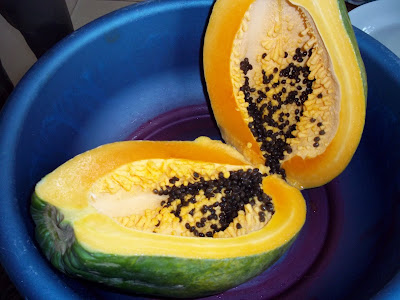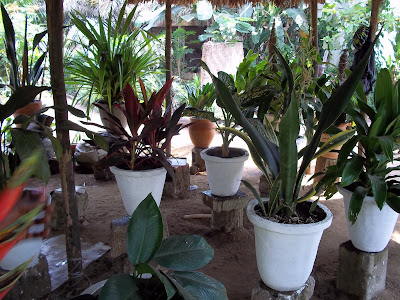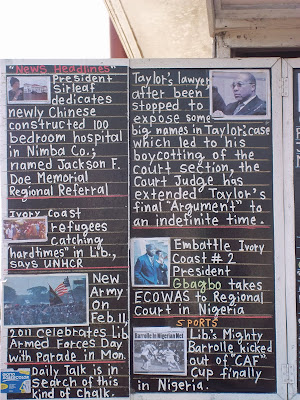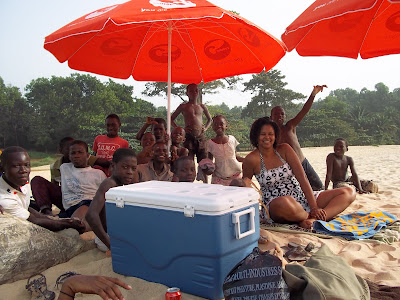


The bottom line is I've been sitting at her buffet brunch all day. I eat a typical Liberian breakfast of casava (or yucca for South American readers) and fish gravy, type a little bit, get back in line for potato greens, type a little more, and finish with the world famous lemon tarts. Watch out for the croissants, they're better than the ones I had in France! Thank Rozi's on Airfield Shortcut in Sinkor for my illustrated posts.
No hangovers in Liberia:
 This is a soursop plant. If you do a little research you will find that this member of the pawpaw family grows where it's hot and tropical, including Liberia. What you won't find out without asking around is that it is an amazing hangover cure. The fruit itself tastes like a tropical Starburst candy without the artificial sugar. A friend of mine explained how he drank liquor in excess, ate some of this fruit in the same evening, and woke up the next day prepared to take on the world again. Earlier in 2010, Time Magazine released an article on the hangover benefits of coconut water. If you refer to my first post in Liberia, you can see why there are too many options of relief for anyone to get sick due to too much alcohol in this country.
This is a soursop plant. If you do a little research you will find that this member of the pawpaw family grows where it's hot and tropical, including Liberia. What you won't find out without asking around is that it is an amazing hangover cure. The fruit itself tastes like a tropical Starburst candy without the artificial sugar. A friend of mine explained how he drank liquor in excess, ate some of this fruit in the same evening, and woke up the next day prepared to take on the world again. Earlier in 2010, Time Magazine released an article on the hangover benefits of coconut water. If you refer to my first post in Liberia, you can see why there are too many options of relief for anyone to get sick due to too much alcohol in this country.For the literary minds:
I love reading about Liberia when I cannot be here. If someone's coming in April however I hold your foot, you must bring me a copy of And Still Peace Did Not Come: A Memoir of Reconciliation by Agnes Kamara- Umunna and Emily Holland. It's available for pre-order right now on Amazon.com. All I've had to feed me is this excerpt, and indeed I want more.

What I want to say is this: For too long, my country, my Liberia, was a difficult place to love. The war came and took everything that was good and loving and peaceful. People grew older and older and still peace did not come. But it's different now. The sorrow is subsiding, and individuals are making peace with the past. A woman is president. Children go to school wearing pressed uniforms, satchels on their heads. "Did you finish your homework?" their mommies call after them, steadying their own buckets of water and bundles of wood. After school, boys shoo cows from the fields to make room for soccer matches. Girls skip rope under trees that look like elephant legs. They are not oblivious to what came before. Still, most of the time they are doing what children should be doing, and that is progress.Now for those of you with middle school aged kids, I think it would be cool for them to read Mamba Point by Kurtis Scaletta. It's a coming of age novel about a 12-yr old boy whose father works for the US Embassy in Liberia during the 1980s. I've not been able to read it for myself, but I'm thirsty for reviews! It must be a nice way to get your 8th graders familiar with my home, pre-war.

Translations:
'I hold your foot' : I beg you; a very strong way to say please (pronounced ah-hole-ya-foot in Liberian English)
Bonus translation
'You got best' : I'm at fault; I'm sorry (pronounced you-gah-bes in Liberian English)
I had to learn the last one while I was here. Someone told me "you got best" and I didn't even know how to respond! Clearly I'm learning and observing everyday! Add these to your Liberian dictionary and use as needed!
'I hold your foot' : I beg you; a very strong way to say please (pronounced ah-hole-ya-foot in Liberian English)
Bonus translation
'You got best' : I'm at fault; I'm sorry (pronounced you-gah-bes in Liberian English)
I had to learn the last one while I was here. Someone told me "you got best" and I didn't even know how to respond! Clearly I'm learning and observing everyday! Add these to your Liberian dictionary and use as needed!
In my backyard:
I got my first taste of a pawpaw this week. I was so excited! Then I tasted it and decided I like it better in the pawpaw pies Rozi makes at her restaurant. It needs sugar. The houseboy says my grandmother used to squeeze a lime on top of the fruit before eating it. The texture of the pawpaw is soft like a banana though it looks similar to a melon. It slices very easily with a knife. Plain and hot like it was, it left a lot to be desired, but what grows from your backyard?? I'm still waiting for my plums!!

Cut it when it's green and yellow like this. Compare to my previous post when the pawpaw was completely green.

Scoop out the seeds and you can eat it easily with a spoon.

The elements of a luxurious bucket bath:
Fact of the matter is that most Liberians do not have running water in their homes. Sure, foreigners and many of the Liberian elite class can take showers, but as I showed you in the last blog post most Liberians make do with water pumped right from the ground. Below I've included a step by step guide on how to take the most luxurious bucket bath of your life.
You will need:
A bucket. This is indeed what it sounds like. You will use water from the bucket to bathe. You also need a small cup with the handle. Both of these are easily found in the streets of Waterside (Waterside is like an outdoor Walmart in Monrovia. Whatever you need they've got it).

And I don't know why they use this tye dye pattern on all the buckets, but it's pretty typical.
You also need the houseboy to fill the large drum of water.

For sanitation, use an antiseptic like dettol.

How to do it:
Have the houseboy boil a pot full of water for you. Pour that into the larger tye dye bucket. Fill the rest with cool water from the large drum. Use the smaller tye dye cup to dip water from the drum into your larger tye dye bucket. We encourage practicality.
Pour two cap fulls of Dettol into your warm water mixture. Now we're sanitary.
I hope you're adult enough to know how to bathe when the water is in front of you. If ever I have to take a bucket bath, which happens sometimes, I put the bucket in the bathtub. If you drive through Monrovia however, you can see lower income families bathing children in the dust by their house so the water can runoff. TIP: Don't put your soap in the large bucket because that is your rinse water. That would be counter-productive. As you need to wet your body, dip the small tye dye cup into the larger tye dye bucket and pour as needed.
Bucket bathing is indeed an experience, and you've got to work to be clean. Nothing beats a cold shower in hot Liberia, but it's always nice to understand how the other 90% lives and bathes.
On a tougher note:
Each time I've been to a foreign-owned restaurant, I've seen a young Liberian girl dining with and doting on an older foreign man. The prostitution in Liberia is too plentiful, and it makes me so ashamed. The girls are no older than my baby sisters, and they prostitute for school fees and as a means to sustain themselves. My boyfriend saw a young girl with barrettes in her hair dining with the father of her newborn child. I would really like to encourage everyone to refer to my mom's news package here and really try to make a proper education within reach for our young women. If we don't invest in our people, we will raise a country full of houseboys and drivers.
Truth be told, I'm not too convinced about the quality of education the children are receiving here anyway. Baby Archel, the daughter of my father's employee, is supposed to be reading now, but she hardly knows how to speak proper English. Her mother doesn't help her read but I don't believe she knows how to read well herself. Even if she did, I haven't been able to find any children's books to read with her. The education gap is so large between Liberian children and children in the states that I wonder if these kids ever be able to lead their own country. Think about how many reading and coloring books you had as a child. Baby Archel has none at all. As I make my living talking and writing, baby Archel gets nervous when people ask her questions and cannot open her mouth to speak audibly when asked a question. This all comes full circle. Will she be able to demand a fair salary for whatever work she decides to do in the future? Will her school equip her to properly fill out a job application? Can Liberia train leaders with this educational structure, or are the young girls in restaurants prostituting for school that cannot properly advance them?
I've got a short Liberian wish list. If you come or know of anyone making their way here, I beg you to please send children's books. I will soon be starting to read to baby Archel and other Kindergartners of Monrovia as I try to help my people catch up. Even one book will help a child develop proper phonetic skills. I will see to that personally.
Love and kisses to all of you from across the Atlantic Ocean. I will be going out with the Carter Center Liberia mid-March! It's not a paid job (yes I'm still looking for one), but I'm still trying to hold NGO's accountable for their work here.






















